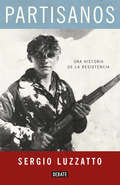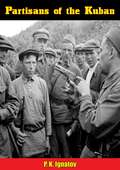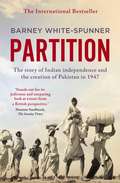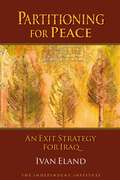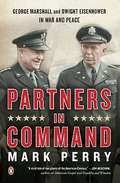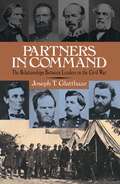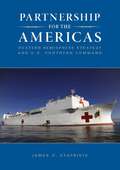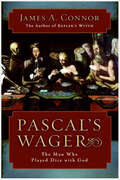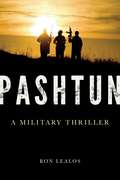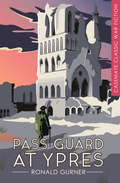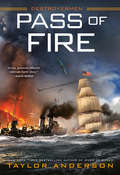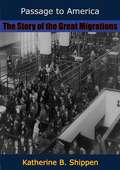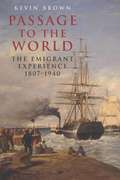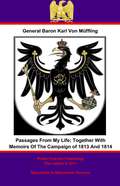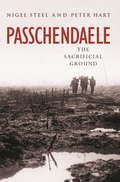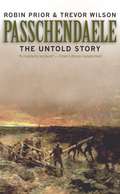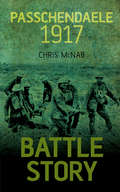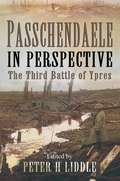- Table View
- List View
Partisanos
by Sergio Luzzatto"Partisanos" se llamaba en dialecto piamontés a los combatientes de la Resistencia, hábiles en el uso de las armas, decididos y resueltos; y así tituló Primo Levi un poema en 1981.Levi; formidable escritor, combatió como partisano en el valle de Aosta en otoño de 1943, pero corrió un tupido velo sobre esas semanas antes de su captura y deportación a Auschwitz, apenas mencionó un «secreto desagradable». Tras investigar este secreto y ampliar la mirada desde el valle de Aosta hasta el noroeste de Italia, Sergio Luzzatto cuenta -a través de una historia de la Resistencia- la historia de la Resistencia y los dilemas morales que acuciaron a los jóvenes de una nación a la desbandada tras la rendición de Italia a los aliados y la creación de la República de Saló. En este libro, que provocó un encendido debate, Luzzatto restituye figuras vivas, y no santos de la Resistencia ni monstruos de Saló. Y entre estas figuras, está la de Primo Levi: dolido, y antes que testigo de la Solución final delproblema judío, testigo de los aspectos más escabrosos de una guerra civil. "Partisanos" es un extraordinario ensayo histórico que ilumina magistralmente el problema fundamental de la legitimidad y la moralidad de la violencia.
Partisans
by Alistair MacLeanMajor Peter Petersen leads a commando force to the Balkans during WWII, to deliver a mysterious message to the Partisans, the Yugoslavian Royalists, from the Fascists. Petersen knew it couldn't be a smooth operation. That sixth sense a veteran acquires warned him -- of a setup. His order reek of doublecross and deception. But he has his own reasons for playing along with the Facists... and delivering them their due!
Partisans of the Kuban
by J. Fineberg P. K. IgnatovThe brutal repressive measures of the German Wehrmacht during the Second World War led to uprisings and partisan actions all over the vast captured territories that were occupied during their triumphal years of 1940 and 1941. Few regions caused as much trouble for the occupying forces than the provinces of Russia, many of whom broke into almost open revolt. This book chronicles the operations of the Ignatov brother's partisan unit which did a great deal of damage to the German war effort in the Kuban. The account is based on a diary that the unit kept during their struggle against the invaders.
Partition: The story of Indian independence and the creation of Pakistan in 1947
by Barney White-SpunnerBetween January and August 1947 the conflicting political, religious and social tensions in India culminated in independence from Britain and the creation of Pakistan. Those months saw the end of ninety years of the British Raj, and the effective power of the Maharajahs, as the Congress Party established itself commanding a democratic government in Delhi. They also witnessed the rushed creation of Pakistan as a country in two halves whose capitals were two thousand kilometers apart. From September to December 1947 the euphoria surrounding the realization of the dream of independence dissipated into shame and incrimination; nearly 1 million people died and countless more lost their homes and their livelihoods as partition was realized. The events of those months would dictate the history of South Asia for the next seventy years, leading to three wars, countless acts of terrorism, polarization around the Cold War powers and to two nations with millions living in poverty spending disproportionate amounts on their military. The roots of much of the violence in the region today, and worldwide, are in the decisions taken that year. Not only were those decisions controversial but the people who made them were themselves to become some of the most enduring characters of the twentieth century. Gandhi and Nehru enjoyed almost saint like status in India, and still do, whilst Jinnah is lionized in Pakistan. The British cast, from Churchill to Attlee and Mountbatten, find their contribution praised and damned in equal measure. Yet it is not only the national players whose stories fascinate. Many of those ordinary people who witnessed the events of that year are still alive. Although most were, predictably, only children, there are still some in their late eighties and nineties who have a clear recollection of the excitement and the horror. Illustrating the story of 1947 with their experiences and what independence and partition meant to the farmers of the Punjab, those living in Lahore and Calcutta, or what it felt like to be a soldier in a divided and largely passive army, makes the story real. Partition will bring to life this terrible era for the Indian Sub Continent.
Partitioning for Peace: An Exit Strategy for Iraq
by Ivan ElandCombining a history of Iraq and its dominant sects with an acute awareness of the political machinations fomenting worldwide, this keen military analysis offers a practical exit strategy for U.S. armed forces in Iraq.Since the history of violence in multi-ethno-sectarian states indicates that such conflicts usually resurface once an occupying force leaves, a solution to end the violence and stabilize the country must be geographically reasonable for sectarian groupings. Ivan Eland explains why partitioning, a solution that has been successful in other chaotic political situations, can be a uniquely effective political and military exit strategy for a country like Iraq. Finally, Dr. Eland documents fifteen lessons that can be learned from previous partitions during the 20th and 21st centuries and applies them directly to the current situation in Iraq.
Partners in Command
by Mark PerryA unique look at the complex relationship between two of America?s foremost World War II leaders The first book ever to explore the relationship between George Marshall and Dwight Eisenhower, Partners in Command eloquently tackles a subject that has eluded historians for years. As Mark Perry charts the crucial impact of this duo on victory in World War II and later as they lay the foundation for triumph in the Cold War, he shows us an unlikely, complex collaboration at the heart of decades of successful American foreign policy?and shatters many of the myths that have evolved about these two great men and the issues that tested their alliance. As exciting to read as it is vitally informative, this work is a signal accomplishment. .
Partners in Command: The Relationships Between Leaders in the Civil War
by Joseph GlatthaarExplores the productive friendships of such contrasting personalities as Grant and Sherman and Robert E. Lee and Stonewall Jackson, bringing to life the struggle between McClellan and Lincoln and Jefferson Davis and Joseph E. Johnston.
Partnership for the Americas: Western Hemisphere Strategy and U.S. Southern Command
by James G. StavridisSince its creation in 1963, United States Southern Command has been led by 30 senior officers representing all four of the armed forces. None has undertaken his leadership responsibilities with the cultural sensitivity and creativity demonstrated by Admiral Jim Stavridis during his tenure in command. Breaking with tradition, Admiral Stavridis discarded the customary military model as he organized the Southern Command Headquarters. In its place he created an organization designed not to subdue adversaries, but instead to build durable and enduring partnerships with friends. His observation that it is the business of Southern Command to launch "ideas not missiles" into the command's area of responsibility gained strategic resonance throughout the Caribbean and Central and South America, and at the highest levels in Washington, D.C..-Print Edition.
Party Shoes
by Noel StreatfeildSet during and after the second World War, this classic novel tells the story of Selina, who has been sent to live with her aunt, uncle, and cousins in the country. When Selina receives a parcel from her godmother in America it causes much excitement among her and her cousins, and, to Selina's delight, the parcel contains a beautiful party dress and a pair of party shoes. But delight turns to dismay when she realizes that she may never have an occasion to wear such a wonderful outfit - until, that is, she and her cousins come up with an idea of organizing a pageant...
Party in the Street
by Fabio Rojas Michael T. HeaneyParty in the Street explores the interaction between political parties and social movements in the United States. Examining the collapse of the post-9/11 antiwar movement against the wars in Iraq and Afghanistan, this book focuses on activism and protest in the United States. It argues that the electoral success of the Democratic Party and President Barack Obama, as well as antipathy toward President George W. Bush, played a greater role in this collapse than did changes in foreign policy. It shows that how people identify with social movements and political parties matters a great deal, and it considers the Tea Party and Occupy Wall Street as comparison cases.
Pascal's Wager: The Man Who Played Dice with God
by James A. ConnorIn a major biography of Blaise Pascal, James Connor explores both the intellectual giant whose theory of probability paved the way for modernity and the devout religious mystic who dared apply probability to faith.
Pashtun: A Military Thriller
by Ron LealosAn adrenaline-filled war story that depicts the challenges of military special operations in a dangerous, boulder-filled landscapeThe Company has a special secret operation planned for one of their top agents: the leaders of the Taliban and al-Qaeda terrorist groups are hiding out in Pashtun country, and they must be eliminated. The job falls to a man they have named Frank Morgan-an agent who stood out as a recruit at Quantico and whose skills resemble those of the legendary Vietnam assassin. The other soldiers claim Frank’s abilities as a sniper and a tracker border on the supernatural and are more than willing to complete this mission with him.Frank begins his adventure in Afghanistan with another Company-appointed soldier: an indestructible lyrical Irishman with a cutting sense of humor and a bottle of Jameson never far from hand. After the men rescue a burqa-clad young woman, they soon discover that the Company has not been honest with them and decide to take a second mate under their wing-a giant who quotes poetry and rap songs while he both enacts torture and lives through his own agonizing trials.They know now that oil, drugs, and greed have led to this quest; assassinating the terrorists is not their main objective. However, this still must be done. After becoming dangerously acquainted with the heroin business in the frontier provinces, Frank and his comrades continue their mission. But the lines have now blurred, and the assignment is more complicated than they expected.Skyhorse Publishing, as well as our Arcade, Yucca, and Good Books imprints, are proud to publish a broad range of books for readers interested in fiction-novels, novellas, political and medical thrillers, comedy, satire, historical fiction, romance, erotic and love stories, mystery, classic literature, folklore and mythology, literary classics including Shakespeare, Dumas, Wilde, Cather, and much more. While not every title we publish becomes a New York Times bestseller or a national bestseller, we are committed to books on subjects that are sometimes overlooked and to authors whose work might not otherwise find a home.
Pass Guard at Ypres: A Novel (Casemate Classic War Fiction #5)
by Ronald GurnerFrom a World War I veteran: A novel of the years-long, brutal battle at Ypres, Belgium, and what it did to the city and the men who fought there. In 1915, a platoon of inexperienced British soldiers arrives in Flanders, excited and anxious for what is to come. But they soon find themselves at Ypres, where the battle-weary Allied troops have dug in and slaughter surrounds them. Soldiers, from privates to senior officers of the wider battalion, frozen by terror and overwhelmed by the relentless stress as the battle drags on, want nothing more than to hide. Young, dedicated officer Freddy Mann is in the thick of it with his men—burying the dead, experiencing the terror of bombardment, and being picked off by snipers. On a journey from idealistic officer barely out of school to battle-hardened cynic barely hanging on as those around him are cut down, Mann suffers a crisis of faith as he loses his belief in the war and everything he once stood for. Written by a WWI veteran, Pass Guard at Ypres brings to life the harrowing realities of the Great War, portraying years of lengthy fighting in—and the pivotal strategic role of—the ancient and once-peaceful town on the bank of the Ieperlee River.
Pass of Fire (Destroyermen #14)
by Taylor AndersonAfter being transported to a strange alternate Earth, Matt Reddy and the crew of the USS Walker have learned desperate times call for desperate measures, in the return to the New York Times bestselling Destroyermen series.Time is running out for the Grand Human and Lemurian Alliance. The longer they take to prepare for their confrontations with the reptilian Grik, the Holy Dominion, and the League of Tripoli, the stronger their enemies become. Ready or not, they have to move--or the price in blood will break them. Matt Reddy and his battered old destroyer USS Walker lead the greatest army the humans and their Lemurian allies have ever assembled up the Zambezi toward the ancient Grik capital city. Standing against them is the largest, most dangerous force of Grik yet gathered. On the far side of the world, General Shinya and his Army of the Sisters are finally prepared for their long-expected assault on the mysterious El Paso del Fuego. Not only is the dreaded Dominion ready and waiting for them; they've formed closer, more sinister ties with the fascist League of Tripoli. Everything is on the line in both complex, grueling campaigns, and the Grand Alliance is stretched to its breaking point. Victory is the only option, whatever the cost, because there can be no second chances.
Passage to America: The Story of the Great Migrations
by Katherine B. ShippenOriginally published in 1950, this is a comprehensive account of the peaks and troughs of migrations to America, beginning with its original formation of the nation through to the influx of Displaced Persons.Relating the American migrations to great movements in world history on the one hand, and to the national ideal of freedom on the other, the author discusses national and cultural migrations specifically—the French, Dutch, Norwegians, Swedes, Germans, Irish, Chinese, Italians, Russians, Russian Jews, and the refugees and survivors of World War II.“Stimulating reading for all young Americans, at home or in the classroom.”—Kirkus Review“Passage to America was not written as propaganda, yet its very nature makes it a weapon fitted to any hand that is raised in the fight for freedom….It is good in these days to find a book that in strong but not bitter style denounces tyranny and, without any frantic flag-waving, upholds the democratic way of Life.”—Sunday Review of Literature“A living story of the meaning of democracy. The narrative moves easily and smoothly, and the book should arouse the interest of anyone over twelve or thirteen who looks at it.”—The Horn Book
Passage to Freedom
by Ken Mochizuki Hiroki SugiharaHere is the authorized true story of Chiune Sugihara, the "Japanese Schindler", who saved thousands of Jews during World War II. "Passage to Freedom" tells Sugihara's heroic story, highlighting his courageous humanity and the importance of a child's opinion in his father's decision. "American Bookseller" Pick of the Lists. Full-color illus.
Passage to Mutiny (Richard Bolitho Ser. #7)
by Alexander KentIn 1789 Captain Richard Bolitho is aboard the frigate Tempest in the South Pacific, where he is to protect English shipping lanes from seagoing enemies. At the same time he must contain a growing mutiny aboard his own ship. Sequel to Command a King's Ship, 1976.
Passage to the World: The Emigrant Experience, 1807–1940
by Kevin BrownFrom the early nineteenth century onwards, literally millions of people left their homes to cross the seas. Some, like the convicts transported to Australia, had no choice; others like the indentured Indian and Chinese labourers had almost no alternative; but the vast majority were driven to escape war, famine or grinding poverty in Europe by seeking a new life abroad. Whatever their circumstances and wherever their destination, the one experience they all shared in common was the sea voyage.This book is centred on the rite of passage that marked the transition from one life to the other, tracing the story of the emigrant, through a fresh look at original sources and first-hand accounts, from the decision to emigrate, the journey to the port and the voyage itself, to arrival in the new world. It describes the emigrant trade, the differing conditions on board sailing ships and steamers, convict and coolie ships, and the perils of overcrowding, epidemics, fire, shipwreck and even cannibalism. It also investigates the varied receptions emigrants were likely to face not necessarily the welcome promised the homeless, tempest-tost by the Statue of Liberty.This unprecedented population shift left few European families untouched by emigration, while the present-day populations of the Americas and Australasia are dominated by the descendants of those who made the journey. This gives the emigrants story a universal interest.
Passages From My Life; Together With Memoirs Of The Campaign of 1813 And 1814
by Pickle Partners Publishing Colonel Philip Yorke General Freiherr Baron Friedrich Karl Ferdinand Von MüfflingThis ebook is purpose built and is proof-read and re-type set from the original to provide an outstanding experience of reflowing text for an ebook reader. Baron von Müffling was an eye-witness to some of the most decisive events of the Napoleonic Wars, born into a noble family he went into the Prussian service, and saw action in the early campaigns of the Revolutionary wars in Holland and Belgium, during which he said he learned very little. He was party to the birth of the famed Prussian General staff and comments of the different personalities such as Scharnhorst, Gneisenau and to a lesser extent Massenbach. On a less happy note he was also a member of the Prussian army that was destroyed by Napoleon in 1806, and notes with some regret of the bumbling planning, ancient commanders and ineffective tactics used. After spending some time kicking his heels away from Prussia, where he might be a liability due to his anti-French views, the collapse of the Grande Armée in 1812 offers a chance for further service and liberation of his country. Attached to the army of Silesia and Blücher for the campaigns of 1813 and 1814, during which he and his countrymen fight their way across Europe into the heart of France. He comments on the battles of Lützen, Bautzen, and the battle of Nations at Leipzig, the strained relationships within the allied headquarters and the deeds of hard fighting and long marches that the Russian and Prussian soldiers make under Blücher. His comments on the 1814 campaign in France are particularly interesting as he was at the heart of the action, and at the side of the conductors of the campaign from the Allied side. He is quick to take issue with erroneous statements made at the time, and by later commentators as to the decisions made and the actions taken. Müffling was allowed little respite after the peace of 1814, plunging back into the fray in 1815 as the Prussian liaison officer at the Duke of Wellington's headquarters. Vivid details and important facts are recounted with extreme modesty, and unlike staff-officers of later years his place on the battlefield at the Duke's side was one of grave danger as the Anglo-Dutch army struggled to hold on to the ridge at Waterloo. His own action was indeed decisive, in two incidents, the first in directing the Prussian reinforcements to the right of the hard-pressed allied line, and secondly in bringing up two British cavalry brigades to take part in the final assault on the French lines. He was appointed the Governor of Paris, a particularly tricky job given the recent struggles and the large numbers of armed men roaming the city, which he dispatched with aplomb. Müffling would go on to many important postings in the Prussian army, and even as an international mediator. An excellent read, full of details of how the Napoleonic Wars was fought and the personalities that bought down the Napoleonic colossus. Author - General Baron Friedrich Karl Ferdinand von Müffling - (1775-1851) Editor - Colonel Philip Yorke (1799-1874) Text taken, whole and complete, from the edition published in 1853, London, by Richard Bentley Original - 520 pages. Linked TOC
Passchendaele
by Peter Hart Nigel SteelIn the autumn of 1917, after years of stalemate at Ypres, the British and French armies launched a massive offensive to take Passchendaele Ridge. Following an intensive bombardment, the Allies began their attack, but the low ground between the lines had been churned into a quagmire, and the attack was literally bogged down.All surprise had been lost, and the German defence in depth was well organised. For the first time the Germans used mustard gas, while German planes flew low to strafe the British infantry with machine guns. After two and a half months the British finally took the ridge they had been aiming for, but at the cost of over 300,000 Allied lives. German losses in the offensive were estimated at 260,000.Based on the archival holdings at the Imperial War Museum, this book gathers together a wealth of material about this horrific offensive. A history to appeal to the scholar and the general reader alike.
Passchendaele
by Peter Hart Nigel SteelIn the autumn of 1917, after years of stalemate at Ypres, the British and French armies launched a massive offensive to take Passchendaele Ridge. Following an intensive bombardment, the Allies began their attack, but the low ground between the lines had been churned into a quagmire, and the attack was literally bogged down.All surprise had been lost, and the German defence in depth was well organised. For the first time the Germans used mustard gas, while German planes flew low to strafe the British infantry with machine guns. After two and a half months the British finally took the ridge they had been aiming for, but at the cost of over 300,000 Allied lives. German losses in the offensive were estimated at 260,000.Based on the archival holdings at the Imperial War Museum, this book gathers together a wealth of material about this horrific offensive. A history to appeal to the scholar and the general reader alike.
Passchendaele
by Robin Prior Trevor WilsonNo conflict of the Great War excites stronger emotions than the war in Flanders in the autumn of 1917, and no name better encapsulates the horror and apparent futility of the Western Front than Passchendaele. By its end there had been 275,000 Allied and 200,000 German casualties. Yet the territorial gains made by the Allies in four desperate months were won back by Germany in only three days the following March. The devastation at Passchendaele, the authors argue, was neither inevitable nor inescapable; perhaps it was not necessary at all. Using a substantial archive of official and private records, much of which has never been previously consulted, Trevor Wilson and Robin Prior provide the fullest account of the campaign ever published.The book examines the political dimension at a level which has hitherto been absent from accounts of "Third Ypres." It establishes what did occur, the options for alternative action, and the fundamental responsibility for the carnage. Prior and Wilson consider the shifting ambitions and stratagems of the high command, examine the logistics of war, and assess what the available manpower, weaponry, technology, and intelligence could realistically have hoped to achieve. And, most powerfully of all, they explore the experience of the soldiers in the light-whether they knew it or not-of what would never be accomplished.
Passchendaele
by Robin Prior Trevor WilsonNo conflict of the Great War excites stronger emotions than the war in Flanders in the autumn of 1917, and no name better encapsulates the horror and apparent futility of the Western Front than Passchendaele. By its end there had been 275,000 Allied and 200,000 German casualties. Yet the territorial gains made by the Allies in four desperate months were won back by Germany in only three days the following March. The devastation at Passchendaele, the authors argue, was neither inevitable nor inescapable; perhaps it was not necessary at all. Using a substantial archive of official and private records, much of which has never been previously consulted, Trevor Wilson and Robin Prior provide the fullest account of the campaign ever published.The book examines the political dimension at a level which has hitherto been absent from accounts of "Third Ypres." It establishes what did occur, the options for alternative action, and the fundamental responsibility for the carnage. Prior and Wilson consider the shifting ambitions and stratagems of the high command, examine the logistics of war, and assess what the available manpower, weaponry, technology, and intelligence could realistically have hoped to achieve. And, most powerfully of all, they explore the experience of the soldiers in the light--whether they knew it or not--of what would never be accomplished.
Passchendaele 1917
by Chris McnabThe Battle of Passchendaele has come to epitomize the mud and blood of the First World War. Passchendaele is perhaps one of the most iconic campaigns of the First World War, coming to symbolize the mud and blood of the battlefield like no other. Fought for over three months under some of the worst conditions of the war, fighting became bogged down in a quagmire that made it almost impossible for any gains to be made. In this Battle Story, Chris McNab seeks to lift the battle out of its controversy and explain what really happened and why. Complete with detailed maps and photographs, as well as fascinating facts and profiles of the leaders, this is the best introduction to this legendary battle.
Passchendaele in Perspective: The Third Battle of Ypres
by Peter H. LiddlePasschendaele In Perspective explores the context and real nature of the participants experience, evaluates British and German High Command, the aerial and maritime dimensions of the battle, the politicians and manpower debates on the home front and it looks at the tactics employed, the weapons and equipment used, the experience of the British; German and indeed French soldiers. It looks thoroughly into the Commonwealth soldiers contribution and makes an unparalleled attempt to examine together in one volume specialist facets of the battle, the weather, field survey and cartography, discipline and morale, and the cultural and social legacy of the battle, in art, literature and commemoration. Each one of its thirty chapters presents a thought-provoking angle on the subject.They add up to an unique analysis of the battle from Commonwealth, American, German, French, Belgian and United Kingdom historians. This book will undoubtedly become a valued work of reference for all those with an interest in World War One.
